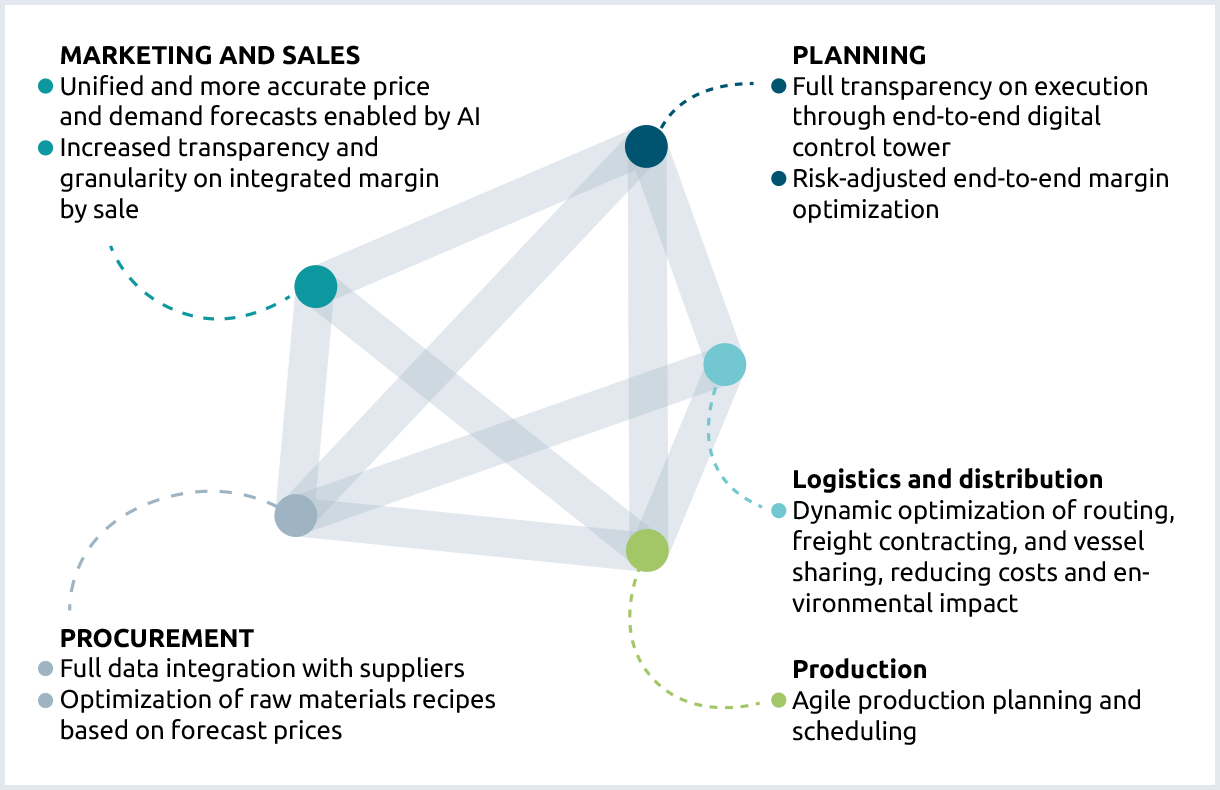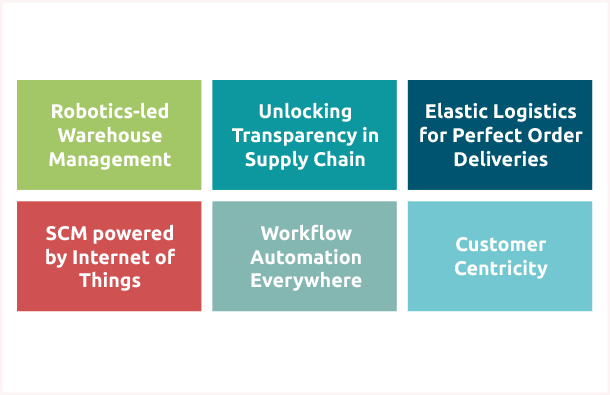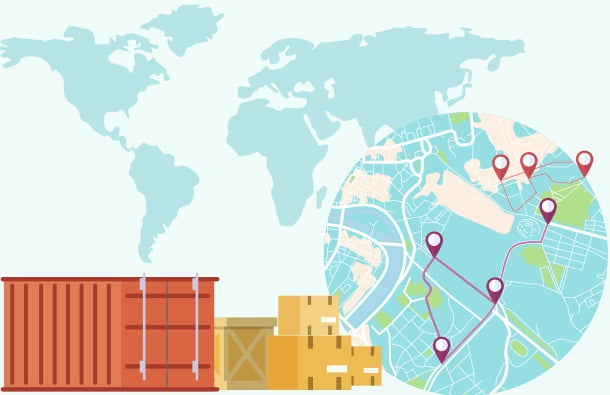Ship Your Goods On Time, Every Time
The global supply chain market is expected to experience a CAGR of 11.2 % from 2020 to 2027. That means a market value increase from $15.85 billion in 2019 to $37.41billion in 2027.
Businesswire

Leverage Artificial Intelligence (AI)
AI amplifies important decisions by using cognitive predictions and recommendations on optimal actions. This helps enhance overall supply chain performance, enabling manufacturers to optimize business outcomes across various scenarios in terms of time, cost, and revenue. Simply put, AI helps streamline the supply chain process by:
- Balancing Supply vs. Demand
- Maintaining Warehouse Efficiency
- Reducing Operations Cost
- Ensuring On-Time Delivery
- Predicting Revenue Increase Methods
According to McKinsey, the future of the supply chain will be a perfect mix of Digital Transformation and Artificial Intelligence, enabling end-to-end transparency and faster decision-making at every stage.

Predictable Unpredictability Is Not Going Away Anytime Soon
A host of challenges has deranged the effort to make the whole supply chain system more efficient. For instance, the supply chain operation has faced massive obstacles during the COVID-19 pandemic. Due to this, the economic environment has become more challenging, and sustainability is at stake. Customers experienced a shortage of products, and the price skyrocketed.
However, contemporary supply chain management (SCM) is focused on making supply chains more integrated than they used to be. Done well, it can significantly improve the overall performance of companies and benefit the economy.

How to Tackle Disruption?
Overcome any challenge you face in the supply chain ecosystem. Here is how you can remain competitive:
- Be resilient and adapt quickly to market disruptions.
- Improve efficiency and effectiveness to remain relevant.
- Keep tabs on the KPIs and useful metrics such as daily performance, cost reduction, production time, lead time, return rate, average response rate, ROA, etc.
- Take the assistance of intelligent technologies to automate and streamline processes. Use technologies that can help you with advanced analytics, Artificial Intelligence, cloud computing, helpdesk features, and digital communication tools.
Latest Trends in the Supply Chain
Industries across the globe continue to battle supply chain disruption. They strive to optimize execution, reduce risk, and identify ways to gain a competitive advantage. To achieve these goals, it is essential to overcome today’s intense labor challenge, maximize digital capabilities, streamline inventory management, and prioritize customer centricity. All these collectively enable supply chains to shape a successful and sustainable future.
- Automation, advanced analytics, Artificial Intelligence, and machine learning will continue to accelerate, helping logistics companies mitigate disruption via digital, agile supply chain management.
- Supply chain dynamism will create flexible networks that can effectively respond to mercurial customer demand and ever-increasing uncertainty.

A majority of industry professionals (70 %) predict that the supply chain will be a key driver of better customer service.
Accenture

Exigency of Digital Transformation in Supply Chain
While there are logistics companies that have made rapid advances in deriving significant benefits from digital, they are still few and far between. However, the level of impact they have created is certainly inspiring for companies alike to maximize the use of technology. It helps them gain competitive advantages along with many other benefits, such as:
→ Operational Efficiency
Traditionally, companies used to focus primarily on reducing costs and improving profits. With time, they realized that this is not enough. Operational efficiency is also critical to success as digital technologies help companies automate processes, leading to increased efficiency and productivity.
→ Data-Driven Strategy
Data and analytics are vital to speeding up processes where companies can make better production and inventory management decisions. Transparency and predictive insights are essential to track the movement of goods and materials in real-time.
→ Customer Experience
Digital technologies have significantly impacted customer experience endeavors, making it easier and faster for companies to interact with customers, including all inbound and outbound communication via voice, email, social media, live chat, and the web. Moreover, the introduction of Artificial Intelligence further bolsters this process.

Route Optimization
A trending logistics technology in high demand is Route Optimization. Route Optimization is about finding the best route to ship and deliver a package from the manufacturing unit to the end recipient as quickly and cost-effectively as possible. This process is focused on minimizing the total shipping time.

Ship Fast, Support Even Faster
A digital communication system is key to strengthening supply chain operations. Logistics companies must consider implementing a unified technology to build a high-performing supply chain ecosystem.
And to simplify customer service, use AI-powered Helpdesk Software that helps streamline shipping, improve supply chain visibility, and handle vendors from one unified console.
Powerful software can help you with:
- Cross-Department Collaboration
- Multichannel Communication
- Case Management
- Delivery & Shipping Information
- Workflow Automation
- Track & Trace Mechanism
- Real-Time Data Processing
- Business Process Modelling
- Advanced Analytics & Predictions
- Software Integration
- Customer Engagement & Management
- Pricing Support

Automatic Information Processing Capability
This is a real use case of one of our clients. Presented audio-visually, this use case explains why you need digital assistance in your supply chain.
Our client faced challenges with real-time data processing because they had a legacy system where they had to perform every task manually. But now, they have optimized their information processing capability with the help of automation.
With workflow automation, they have reduced manual search time, minimized workload, and eliminated application hopping. Data processing has become super-easy!
Please accept marketing-cookies to watch this video.
If Supply Chain Had an Arch Enemy, It Would Be Called Bad Communication
Customers demand faster delivery. A robust digital communication system can cater to this demand by optimizing operational efficiencies – throughout the movement of items from manufacturing units to the end users – at every stage of the supply chain.
Read this article on communication strategies in logistics – about how a unified helpdesk solution can help improve service quality and increase team productivity.


